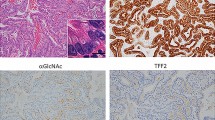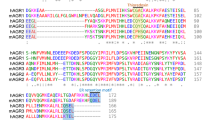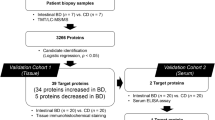Abstract
Small intestine mucin antigen (SIMA) is an oncofoetal antigen for the colon and is distinct from the normal large intestinal mucin antigen (LIMA). In the present study, a panel of anti-SIMA and anti-LIMA monoclonal antibodies (MAb) was used to charaterise altered mucin expression in colorectal adenocarcinomas, by immunohistochemistry and quantitative immunoassays of tissue extracts. These results are compared with CEA expression and correlated with various clinicopathological indices. All mucin MAb reacted with a high proportion of the 100 colon cancers of every stage, histological type (including non-mucinous cancers), differentiation, site, or size. Inappropriate SIMA production was detected by either anti-SIMA MAb 4D3 or 4A1, even in 85% of early stage cancers. MAb 4D3 reacted with a higher proportion of cancers of smaller size and better differentiation. At the subcellular level, both anti-SIMA MAb showed reactivity typical of normal mucin, i.e., goblet cell and extracellular mucin. The normal colonic antigen, LIMA, was also detectable in the majority of cases, but quantitatively overproduced in some cases and reduced in others. However, in contrast to SIMA, LIMA was detected in predominantly undifferentiated cancer cells but not in goblet cells. Heterogeneity of MAb reactivity between cases and complementarity within each cancer was frequently observed. Mucin reactive with at least one of the MAb was detected in all of the CEA-negative cancers. A high rate of inappropriate SIMA expression was also detected in the perineoplastic transitional mucosa (88%, c.f. CEA, 35%) and adjacent, morphologically normal mucosa (80% c.f. CEA, 24%), indicating biochemical changes similar to the cancer. This panel of anti-mucin MAb demonstrated altered mucin glycoprotein metabolism associated with the development and progression of most colorectal cancers, which emphasises their utility as indicators of neoplastic change in the colon, and their superiority to CEA.
This is a preview of subscription content, access via your institution
Access options
Subscribe to this journal
Receive 24 print issues and online access
$259.00 per year
only $10.79 per issue
Buy this article
- Purchase on Springer Link
- Instant access to full article PDF
Prices may be subject to local taxes which are calculated during checkout
Similar content being viewed by others
Author information
Authors and Affiliations
Rights and permissions
About this article
Cite this article
Hertzog, P., Pilbrow, S., Pedersen, J. et al. Aberrant expression of intestinal mucin antigens associated with colorectal carcinoma defined by a panel of monoclonal antibodies. Br J Cancer 64, 799–808 (1991). https://doi.org/10.1038/bjc.1991.404
Issue Date:
DOI: https://doi.org/10.1038/bjc.1991.404



